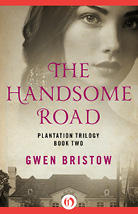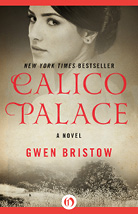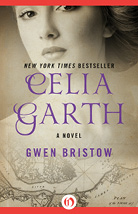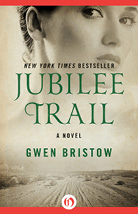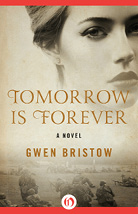Calico Palace (87 page)
Authors: Gwen Bristow

“It’s not stupid,” said Pocket, “for a man to know what he wants.”
“It’s imbecilic,” said Marny, “for a man to want a woman who’d be marrying him for his money.”
Pocket gave his head an exasperated shake, like a teacher tired of trying to teach a pupil who did not want to learn. “Marny, I keep on telling you, I love you. And when I say that, I mean I want to give you what you want.”
“Do you think I ought to want money so much?”
“How do I know what you ‘ought’ to want?” he exclaimed. “I don’t know what I ‘ought’ to want myself. But I know what I do want, and I want you. Now will you say yes?”
“No!” said Marny. She shot the word at him like a bullet.
“But why not?” he demanded. This time his manner was forceful. “Tell me, Marny.”
She did not answer.
Pocket repeated, “Tell me, Marny.”
Marny took out the cards again. She looked down at them, fondling them, as she spoke. “It wouldn’t be fair of me not to answer,” she said slowly. “Pocket, you say you love me and I believe you. It would be easy for me to love you back. But marry you—no. Not you or anybody else.”
More gently now, Pocket said, “Why not, Marny?”
Marny stroked the cards. “You think I would change when I got married. You think I’d be like Rosabel. A happy housewife. Pouring tea by the fire. Going to market to buy carrots for dinner. Getting a thrill out of being approved of by Mrs. Eustis and Mrs. Chase—”
She stopped, because Pocket had burst out laughing and was holding a handkerchief over his lips to smother his mirth. When he could speak he said,
“Marny, I haven’t got a fancy education like yours but I’m not half-witted.” Crumpling the handkerchief, he pushed it back into his pocket. “I do not think,” he said with emphasis, “that you would be in the least like Rosabel. I don’t want you to be like Rosabel. If I love you the way you are why should I want you to be different?”
Marny’s look was full of perplexity. “Then what do you want me to do?”
“I want you to marry me,” said Pocket.
Marny shook her head. “You’d want me to give up the Calico Palace—”
“I would not,” said Pocket. He stood with his hands thrust into the untidy pockets at either side of his coat. “Why do you keep imagining you can look into my mind and tell me what I want? I know what I want.”
Marny looked down at her cards, as if drawing courage from her best friends. “Now that I’m telling you the truth, I’d better tell you all of it. Pocket, I don’t want to get married because—because I’m scared.”
This time Pocket was the one astonished. “Scared?” he repeated. “Of me?”
“Not of you,” said Marny. “I’m scared of getting too close to anybody.” She looked up, and almost fiercely she exclaimed, “I won’t take any more well-meant meddling. I won’t have any more attacks on—well, on
me.
”
Her words snapped at him. She paused abruptly, as if startled and embarrassed by her own candor. Pocket realized that she had not finished all she had to tell him. He waited, and after a pause she went on.
“Maybe you don’t understand that. But I’ve fought so long and hard for the freedom to be myself. Now I’ve got it, and that’s my dearest treasure. I’ll gamble with everything else, but not with that. For a minute there, I thought your bank account would be worth the risk. But as soon as you offered it to me, I knew it wasn’t. Never again am I going to try to fit anybody’s pattern but my own. All right, now you know.”
Pocket did not reply at once. His look had changed. He was regarding her now with a new tenderness. Softly and lovingly, he said, “Marny, there’s something about me you simply haven’t got in your head yet. Put up those cards and let me explain.”
Frankly baffled, Marny put away the cards. Pocket took her hands in both of his, and gently led her back to the chair. She yielded, though reluctantly, and sat down. Pocket went around to his side of the table and sat down too. He spoke to her earnestly.
“Marny, I’ve heard a lot of people talk about love. But they don’t seem to mean what I mean. They say, ‘Because I love you, you must do what I want you to do.’ That’s not what I mean at all. What I mean is, because I love you, I want you to do what
you
want to do.”
There was another pause. Marny cupped her chin in her hands and faced him. “I don’t believe you,” she said.
“Why not?” asked Pocket.
“Because,” she returned, “there isn’t anybody like that in the world.”
“Yes there is,” said Pocket. “There’s me.”
She shook her head.
“I’ll say it again,” said Pocket. “I want you to do what you want to do. I don’t want to change one thing about you. I don’t want you to be like me. I want you to be like
you.
There’s a lot of difference.”
Marny sat up straight. She struck the table a blow. “Oh, what a difference!”
She lifted her shoulders and dropped them as if trying to throw off a burden. When she spoke again she spoke slowly, again with a frankness she did not often show.
“Pocket, a lot of people have said they loved me. My family, my teachers, all those fine characters in Philadelphia. They said they loved me, then they tried to prove it by nearly driving me out of my mind. All they did, morning-noon-and-night, was try to make me different from the way I was. They could not understand that I wasn’t like them and couldn’t be like them. I couldn’t change my nature any more than I could change the color of my eyes. I tried to please them.”
Pocket was listening closely. He did not try to interrupt her. He realized that what she was saying had been piling up in her mind for a long time, and it was a relief for her to talk about it now.
“I tried to please them,” Marny repeated, “and everything I did was wrong. Oh, I laugh about it now, but I laugh because I don’t want anybody to know—I suppose I don’t want to remember—that I had such a painful time growing up. No matter how hard I tried, I didn’t fit. I was always out of place, I was always
wrong.
So at last I quit trying.”
This time he answered her. “And none too soon,” he said. His voice was low and full of compassion.
She smiled at him gratefully. Pocket said,
“But I’ve told you and told you, I don’t want you to change. I’m in love with
you.
If you changed you’d be somebody else and I wouldn’t be in love with that somebody else.” He smiled at her, Pocket’s sweet, engaging smile. “Now do you understand?”
Marny spoke with wonder. “And you don’t want me to change in any way at all?”
“Not any way at all.”
“You don’t want me to leave the Calico Palace?”
“No,” said Pocket.
“You wouldn’t want me to live in some dim little cubbyhole, just to keep the leeches from pestering you?”
“Of course not. If I had an extravagant wife I could always say, ‘She spends every cent as fast as it comes in, I can’t give you anything.’”
Marny had not meant to laugh, but now she was laughing. She asked, “Where would we live?”
“One of my tenants,” said Pocket, “is planning a hotel more sumptuous than the Union Hotel ever was. He could put in a suite for us. You’d plan the suite, and furnish it. I wouldn’t know how. The fact is, Marny, I’ve never lived in real luxury. I’d like to try it.” He began to laugh too. “You and I are a lot more alike than you realize. And as I mentioned before, I love you. It
would
work, Marny.”
Marny looked down. She considered, long and thoughtfully. “I—wonder,” she said slowly. “I wonder. Wait. Let me see.”
She took out the cards.
Pocket pushed back his chair. He came around to her side of the table and stood looking down at the pack in her hand. “I see. You want to consult your friends.”
Marny gave a start of defense. “Do you mind?” she flashed at him.
“Some day,” Pocket answered patiently, “you’re going to get it into that thick head of yours that I don’t mind anything you do. I love you the way you are. Long before I asked you to marry me I knew you liked to ask the cards about your future. Why shouldn’t you?”
Placated, Marny began to lay out the cards. Pocket stood by her and watched. All of a sudden Marny stopped, holding a card halfway between the pack and the table. “Pocket!” she exclaimed.
“Yes ma’am?” said Pocket.
“I’ve just thought of something,” said Marny, still holding the card in midair. “I don’t need to ask the cards to foretell anything about this. I foretold it myself, a long time ago.”
As she looked up from the layout to Pocket she saw a humorous quiver about his lips. “Yes,” he said, “I remember.”
“You do?”
Again Pocket pulled out a handkerchief—a different handkerchief this time, as he usually carried five or six—and again he was laughing.
“Why yes,” he replied, “that day at Sutter’s Fort when you found that Delbert had gone off with your dust.”
With a teasing green twinkle, Marny nodded. Pocket went on,
“You said to me, ‘Somewhere in the world there’s some chump of a man who’s going to pay me for this.’”
Marny was laughing too, her own soft silken laughter. “Yes, that’s right. And I said, ‘Trust me, Pocket. I’ll find him.’” She reached up and used the card to stroke his cheek. “Pocket,” she continued, and though she was laughing there was a note of astonishment in her voice, “Pocket, I do believe I’ve found that chump of a man.”
Pocket too was still laughing. “It looks that way,” he said.
But then Marny gave a start, and caught her breath. “Pocket—that’s not exactly right. I didn’t find you. You found me.”
Tossing all the cards on the table, she stood up and grabbed his hands in hers and held them.
“Pocket, are those hoodlums going to set another fire?”
This time Pocket spoke gravely. “There’s talk of it. I’m afraid they are.”
Her grip on his hands tightened. “And that man—the tenant you were telling me about—he’s still going to build that sumptuous hotel?”
“Why yes,” Pocket answered smiling. Then he was grave again. “It’s the same old war, Marny. The folks who want to build and the folks who want to destroy. I guess it’ll be going on as long as the world lasts. Anyway, we know which side we’re on.”
Marny let go his hands. “We,” she repeated. “
We,
Pocket!”
“Yes, dear,” he said gently.
“Just think,” she murmured, “I don’t have to pretend any more that I like it when nobody cares what becomes of me.”
Pocket put his arms around her and she dropped her head on his shoulder.
“You chump of a man,” she whispered, “I’m so glad you found me.”
Gwen Bristow (1903–1980), the author of seven bestselling historical novels that bring to life momentous events in American history, such as the siege of Charleston during the American Revolution (
Celia Garth
) and the great California gold rush (
Calico Palace
), was born in South Carolina, where the Bristow family had settled in the seventeenth century. After graduating from Judson College in Alabama and attending the Columbia School of Journalism, Bristow worked as a reporter for New Orleans’
Times-Picayune
from 1925 to 1934. Through her husband, screenwriter Bruce Manning, she developed an interest in longer forms of writing—novels and screenplays.
After Bristow moved to Hollywood, her literary career took off with the publication of
Deep Summer
, the first novel in a trilogy of Louisiana-set historical novels, which also includes
The Handsome Road
and
This Side of Glory
. Bristow continued to write about the American South and explored the settling of the American West in her bestselling novels
Jubilee Trail
, which was made into a film in 1954, and in her only work of nonfiction,
Golden Dreams
. Her novel
Tomorrow Is Forever
also became a film, starring Claudette Colbert, Orson Welles, and Natalie Wood, in 1946.
All rights reserved, including without limitation the right to reproduce this ebook or any portion thereof in any form or by any means, whether electronic or mechanical, now known or hereinafter invented, without the express written permission of the publisher.
This is a work of fiction. Names, characters, places, events, and incidents either are the product of the author’s imagination or are used fictitiously. Any resemblance to actual persons, living or dead, businesses, companies, events, or locales is entirely coincidental.
Copyright © 1970 by Gwen Bristow
Cover design by Connie Gabbert
978-1-4804-8510-5
This edition published in 2014 by Open Road Integrated Media, Inc.
345 Hudson Street
New York, NY 10014


